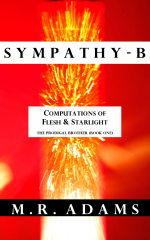M.R. Adams's Blog, page 3
May 28, 2013
Craft of Fiction: On Jargon: Dialogue and Talking Heads
The average reader seems to have a two-dimensional understanding of craft based heavily on amateur/student writer jargon that have become buzz words: “talking heads,” “well rounded characters,” etc.
However, what’s the difference between “talking heads” and an extended dialogue scene?
People don’t quite understand the principles under the catchy, easy-to-remember phrases. Hence, they just stereotype any ongoing dialogue scene as a talking head scene. But an extended dialogue scene has something talking heads don’t: subtextual themes and personalities. Unfortunately, subtext is a dangerous tool for writers in mainstream society. Most readers will never pick up on it. At some point in time, every theme/trait has to be explicitly spelled out and wrapped in a nice bow. Well, if you want a genre bestseller anyway.
In an extended dialogue scene, the voice is true to characters. Because the voice, the style, is engaged, the character is revealing their beliefs and personality without explanation. This can happen even if the dialogue scene’s main Narrative function is to explain something that happened. In talking head scenes, the voices sound contrived, the writer throwing his voice often for info dumping.
In my novel Sympathy-B, Silby Masters has to explain a situation to her employer. A large paragraph of dialogue happens. But you learn about her from the way she talks. She rambles: she’s nervous. She takes a defensive tone: even though her boss intimidates her, she takes enough pride in her work to defend herself. I don’t say she rambles; I portray her rambling through the rhythm of syntax. People may say it’s wordy and redundant and hard to follow. But art can’t capture humanity by not going outside the average mind’s bounds (unless you can argue the average person completely understands humanity). And this is why many pop readers are becoming so disinterested in their favorite genres. If the novel expands its horizons, it’s shut down. But reading the same two dimensional approach gets really boring. The beautiful thing as a writer, is that you don’t even need an expanded sense of people to make subtext work. It comes down to detailing. Subtext is naturally occurring. But if readers aren’t open, then what? Each writer decides for themselves.


May 27, 2013
On Pretentiousness
There is this idea that a writer shouldn’t be arrogant or generally unlikeable. And there is confusion as to how someone who writes masterpieces could be arrogant, because surely great artists love people. But no, you can hate people and write beautiful life affirming works.
“Pretentiousness” is a loaded term in our society. It’s a buzzword used to dismantle writers who dare defy the average IQ of the average reader. Even those who love difficult novels will usually add some disclaimer to preemptively acknowledge that someone will call a book they love pretentious. “This is a great novel. Yes, a tad pretentious, but…” This is more a concern for living authors publishing in the new climate. Books already deemed classics are safe.
No one takes responsibility for their perception of pretentiousness. No one realizes that calling someone the term just means you are approximating your level of Reader IQ. Let’s say someone uses the word “superfluous” in a sentence. One person barely notes the diction. To them it’s a common word and they are familiar with it’s meaning. Another lashes out “Wow, don’t be pretentious. I shouldn’t need a dictionary to understand you.” And a third knows the word is common, knows its meaning, but still says, “You are very smart, but a tad pretentiousness.” Each one has said more about themselves than the person speaking. We know how each one reads diction, and where they stand in society (either outside, inside, or on the edge looking in).
A pretentious artist trumps a pretentious reader. Sorry readers, but your constant claims of pretentiousness harms literature despite any merit the statement may have. Art does not have to come from good people. Why? Because art is portrayal. Art does not have to judge. Art can paint all that is “good,” and all that is “bad.” Great artists may seek to create detailed mosaics of greed, lust, self-righteousness, and narcissism, not just weave moral fables denouncing them. And a self-aware (not self-conscious) narcissist may be the best artist to express all his layers in a fictional alter ego. Anything that expands the possibilities of art is good, and a pretentious/arrogant/self-indulgent artist expands on the possibilities of art, because A) their rich inner world informs their writing and B) they don’t care enough about what other thinks to conform. Normal people often do not have the complexities of personality, and hence beliefs and ideas, to create characters that are beyond generic. Craft can only compensate so much. With craft, when can intellectualize ways to add layers and paradoxes to characters, but the result will at best be serviceable, of-the-moment fiction. We can prosper, find an audience, with hard work, but we’ll have to leave the timeless complex profound masterpieces to the disgruntled, cranky, socially awkward and condescending geniuses. Although, there are some wonderfully likeable authors who write great works. But the question remains: is it authentic or an adopted social persona? What’s really going on under the surface?
Society does not like diversity. I’m talking about diversity of personalities. We as a society are anti-introverts. We don’t like grumpy people either. We want everyone regardless of race, gender, or mohawk to be appreciative and “likeable,” the buzzword that embodies all the salesman-like traits someone should be. If you are older you can be world weary, but only in a comical way.
A pretentious artist may hate people but love humanity. He may philosophize about love while hating the insipid scene of actual people in love. He delves intellectually and spirtually into ideas and philosophies of psyche and spirit, humanity, not pop psychological Oprahisms. Also, arrogance is a defense mechanism for artists. By thinking people stupid, a writer gains the distance from people necessary to observe them while still ennacting their own unique vision. It’s a buffer against conformity.
Art is expression. Even if you are a corporate cog trying to cater to the latest dystopian trend, the art you create is an expression of your conformity. You can’t not express yourself. If art is expression, then most people, especially during the drafting phase, won’t understand what you are writing. And people revert very quickly to social norms when they don’t understand something. So what keeps a writer on the course? The belief that people don’t know what they are talking about. So why write at all? No good writer takes the logic that far. Compartmentalize. You write because you feel compelled. You publish just because that’s what you do. Although it’s more acceptable than ever to admit you write for money. Once you would be shunned for admitting that. But now it’s all the rage.
Pretentiousness keeps a writer on course. It keeps them from compromising, and compromising is good in business but not art. Art that is not founded on definitive principles but on a compromising of principles often has no real audience. It’s too A for B, and too B for A. Pretentious writers continue to stretch the boundaries outside the comfort zone of the mainstream. Art wins.
There are two kinds of pretentious readers. Pretentious populists and pretentious elitists. They are both extremes; they both limit what art can be, and hence exist to the detriment of art. Pretentious populists are quick to project their arrogance on writers.
Learning how to read does not stop after graduation, yet everyone think they are a good reader just because they graduated. But no. There are not just grade school reading levels but also adult reading levels. There is being able to read J.K. Rowling, then Stephen King, then Charles Dickens, then Virginia Woolf, then James Joyce. Grade school reading is all about being able to comprehend increasingly difficult texts. Adult reading levels is about being able to understand the subtext of increasingly different texts as well as comprehending texts that get deemed “experimental.” It pushes beyond academia. It’s the journey any good reader goes on for the rest of their lives.
Pretentious populists judge what they can’t understand. Literature must be understood by everyone. Illiterates are not considered (elitism). Whenever a text goes beyond their diction, their grasp of grammar/syntax, their ability to read narrative, the writer is pretentious. Some readers love the “difficult” read but are so aware of public perceptions that they have trouble being vocal in their love for the text. She doesn’t want to appear elitist. And elitist is the worse thing to be. Don’t have standards; don’t have taste. Don’t call something simple, just say it’s not for you. However, pretentious populists are self serving in their beliefs. If an elitest attacks them, they argue they shouldn’t be judged and people just like what they like. But yet see them complain about the generic quality of their fiction pools. When writers try to appeal to these readers, they resort to simple executions of craft that even many populists admit are crap.
With pretentious populists, if literature reaches for a certain level of complexity in diction or style, something is wrong with the writer…not them. The writer has to work within a certain norm. But does the truth of existence reside in this stylistic range. Probably not. Art may never find Truth, but it’s attempt to do so (and maybe even asymptote) is part of the beauty. And only an arrogant woman thinks she can capture the essence of humanity in prose.
Most pretentious populists are unconsciously created from/responding to pretentious elitists. Populists fear judgment so they judge first. Pretentious elitests are the ones always thinking people stupid for not reading the high brow stuff. Society is so against them, that there’s no need to say more. Everyone gets it. They find a whole stylistic range of art beneath them. That’s exclusionary. Art should be democratic in a democratic society, somehow finding the balance between quality and aesthetics via relativity–being relative, but not too relative. There are great mysteries, great romances, and so on.


May 26, 2013
Reanalyzing Goodreads
Ultimately, I’m always thankful for the hardtimes. The negative reviews on my songs got me to refocus on what my vision was when I first started writing lyrics.
And recent events, of hitting a brick wall with finding reviews and an audience, have made me re-evaluate my career. I was making a lot of decisions based on what I “should” be doing. And “should” means “what society says you have to do.” And may be it’s true. But in reality, most people do not succeed in any particular endeavor, rules be worshipped or rule be damned.
On a high of a embarking on a new venture, I spread my social wings. But as in college, I got over it and was ready to return to the cocoon. So I’ve pruned back and refocused on the one or two thiings I liked to establish my online presence: facebook and blogging. They are relatively controlled cultures that are open to those interested and shut the rest out.
I joined Goodreads initially for my own purposes. Since university, I kind of miss not writing research papers, but I would never write one just for the hell of it. But Goodreads at least served as a reading journal, a place to jot down my ideas of a book upon finishing. I never cared about the groups or other reviews or even meeting people. My only friends were from people who were from facebook, and I never read the feed.
Unfortunately, becoming an author has ruined Goodreads. Having my own work there, checking for reviews and ratings, haunting forums, and constantly seeing my book on my dashboard, has taken me away from my joy and intoa place I didn’t want to be. I wanted to focus on MY craft and MY stories, not on self promotion and being constantly faced with the tastes of a status quo I never fit in with before.
Being a writer is odd in that way, especially when your sensibilities is not in line with others. You want readers, but when you’ve never met anyone who reads like you (a bit of hyperbole but I’ll keep it moving) then how do you find readers. Writers write what they want to read. Some want to read what everyone else reads so they write what others want to read and prosper. But when you were always a minority among readers, why would you be anything more than a minority among writers? Unless, there really are untapped potential pools of readers that can be coalesced, manifested into a readership. I think that’s my experiment.
As I read my goodreads reviews though I didn’t like quite a few of them. Goodreads may have been my reading journal; yet there are quite a few qualitative reviews. Even I couldn’t help but conform to the good/bad reviews I don’t like. I am a close reader. I find books I love, and zero in on them. But with Goodreads, books I would have normally moved on from, I took the time critique.
When I do negative critiquing it’s usually along a political line, assessing the portrayals of minorities. I am okay with that. It’s necessary at this time in our cultural, when so many heterosexual white people are finally trying to incorporate diversity, to bring some attention to how they do it (and how they do it reveals unconscious beliefs).
So Goodreads was not that private utopia I thought it was. Even with no interaction, it’s culture seeped in. My reviews are written selfconsciously, I am aware how the general audience feels about the book and I frame response as a reaction. For example:
“Trollope is not the plotter that Dickens is; the strength is the characterization. At times the characters rehashing their central conflict may seem redundant, but I found Trollope revealed slight psychological shifts each time.”
The first sentence isn’t even my opinion. It what I’ve generally picked up on from reading reviews. The second sentence is also what I’ve picked up on from others and only the second full clause actually gets to how I feel.
1) Trollope is not the plotter that Dickens is;
2) the strength is the characterization.
3) At times the characters rehashing their central conflict may seem but,
4) I found Trollope revealed slight psychological shifts each time.
Only one of those four ideas is mine, and it’s the last one. While I was reading I noticed the shifts, locked into the world of my mind and the text. But once the novel was over, I began to negotiate my ideas with society’s. If this happens with reading, then I can only imagine how this has played out with larger concerns *cough cough* my writing career.
Actually, I think I’m relatively immune when it comes to writing. With my reading, society only came creeping in when the reading was over. It’s the same with my writing. I write in joy, inspired. But once I’m done, society’s tastes, beliefs, and standards overwhelm me. Will people accept the gay characters? Should I warn them that they are there? No. I shouldn’t have to warn people. That’s what’s wrong with the world.
So slowly, I’m finding my way back to myself. I got lost in the zeitgeist of hope (not the first time). The opportunity self-publishing presented after the failure of going the agency route made me dive head first into a culture without evaluating my goals, my vision for my life. If I’m going to fail, then it might as well as be on my terms. I’m never going to write about some doe eyed white girl struggling to find love with a brooding white boy in the ruins of the Statue of Liberty, and if I do, then I’m gone. I may be rich, but I would be numb, void of any feeling or need for feeling fulfillment. Self-fulfillment for an artist is non-negotiable. You have to be proud of your art AND see your at thrive. If one of those elements is missing, you’re miserable. If you’re rich from works that resemble those you can’t stand, you suffer in quiet. No one wants to hear the writer their jealous of complain.
So how do I get back to being the reader I want to be, the reader I was? Can I write about my reading without falling into the “customer review” mode? I shall find out. But first, I’m getting off Goodreads. So far this blog has been a good “private” place, I’ll try here. I’ve also stopped promoting my twitter. I have my website and my blog and my facebook. Three sources that are relatively filtered. People can’t/won’t just randomly tell me they don’t like me or my work.It’ll give me an honest assessment of who my true readership is. Thankfully, I got nothing out of Goodreads as a self-promotor, so it’s not like I’m missing out on a great business opportunity. I am no longer engaged by the site; I don’t need the site. As a reader and writer, I can move on. Win/win. And it’s been a while since I had any kind of win.
UPDATE: August 25, 2013
So I’ve re-engaged Goodreads, not as a reader, but as a writer. I really don’t check my reviews but have found value in the indie writing groups and book giveaways. Also, maintaining an author profile allows me to make sure my books are properly grouped.


May 10, 2013
On Television: Action and Soap Opera; Scandal and Arrow

Weak for love. If you count a man turning you around, hiking up your skirt, and undoing his zipper as love.
For the past several years, my consumption of TV has increased as a direct result of my movie-going and book-reading decline. Movies just couldn’t give me the characters; books, the action (without amateur level writing). So, TV seemed like a good medium. I didn’t need to think too much; I could be distracted by the internet. It was escapism after a hard days work. But quite frankly, I find TV viewing aggravating. And it’s draining. I’m a zombie.
Simply put, TV writing really is god awful. And even good shows, the ones hailed as art, really aren’t that ambitious. They are narrow in their scope and stylish. Anyway, I spend more time frustrated over the things shows get wrong, which has counteracted any joy from when I started watching.
I’m particularly thinking about Scandal. My progression watching Shonda Rhimes’s show mirrors that of her first show, Grey’s Anatomy. Both started as hardboiled professional dramas with some quirky characterization that diffused more and more into overwrought soap operatics. I watched less; everyone else watched more. Now, Scandal is no longer even episodic, the weekly “Fixer” cases completely gone, the main storyline of “Who’s the Mole?” not even a real a storyline, just a placeholder for tension while the soap opera of Olivia and Fitz continues to play out. Where once the romantic (read: lust) storyline played in the background as a thread of tension that charged the political storylines, the romance has pushed all aside and dominated, to the point where the revelation of the mole just seemed not that big of a deal (and it didn’t help that I’d completely forgotten who that character was). The big deal heading into Scandal’s second season finale is…Fitz chose Olivia, will she give up “fixing” and be his first lady? The answer should be “no.” Since choosing her, he’s increasingly become more bossy, exercising his role as alpha male. She’s letting him. I get it: she’s shocked. But sooner or later, time to wake up, honey. This isn’t love. It’s lust. It’s power. It’s dreaming, “If only I could be normal and want what every woman wants…a strong man and some babies and to be happy.” But the closer you get to it, the more it’s a nightmare. The grass is always greener on the other side.

Double banger: He’s shirtless, but he has scars.
Aarow is another show where the balance and weaving of soap opera and action really doesn’t work. Whereas in Scandal, the romance is dumbing down what still is (if not as much) a sharp, intelligent show, in Arrow the game of hearts is just turning the whole thing into a still salvageable mess. Although, even without the romances, it would still be a solid B-rated show.
In the beginning Arrow introduced too many love interests. Pretty girl after pretty girl was introduced, always making doe eyes at the lead. The Huntress was an interesting subversion of this, but not enough to make it all work. The women are pretty much set pieces to work between the archer and his villain. Dinah started out as a strong female lead; she was independent from the hero and had her own goals. However, now in Oliver’s orbit, she’s just a love interest, a catalyst in the darkening Oliver/Tommy dynamic. The characters are being forced into an overbaked, hormonal triangle. I’m not even going to begin unpacking the dumbness and rash logic that has led to the triangle generating story, but suffice to say, it’s ridiculous if Dinah is used to turn Tommy evil. And Malcolm and Tommy are too much like Spiderman’s Green Goblin, or so it seems right now.
Over and over, I see shows I love get bogged down in poorly written soap opera, where the characters take on nonsensical motivations in the name of a writer’s high themes. It’s supposed to be art, but it’s an amateurish mess that audiences obviously love. The one show I loved that balanced romance and action, with the action maintaining favor is now cancelled…Deception.
With Deception, there was a central love triangle; however, the triangle wa built into the story; it didn’t diffuse it. But I have to accept what I want to see is not what anyone else wants to see. I like hard boiled, high stakes soaps like Dallas, Ringer, and Deception, whereas most seem to prefer there soaps more relationship focused. The more Scandal turns into a love story, the bigger of a hit it becomes. Arrow’s conceit forces it to continue to struggle to maintain balance, and I think having a male lead plays a large role in its allowing to do so while increasing in popularity. Arrow isn’t classiied as a soap…it’s a superhero drama with strong character elements. No, it’s a soap. Making Oliver’s mother so central to the conflict ensure that. Soaps aren’t just about romance. Soaps can be centered around family (and I’d argue work better this way).
Also, there’s a catch-22, a very draining frustrating catch-22, to TV viewing especially pilot seasons. You want to invest, but you are afraid if you do the rug will be pulled from under you when it’s cancelled with no resolution, but if you don’t invest then it’s going to get cancelled anyway. I’m aware that’s a run-on. NBC could have at least aired a miniseries over the summer to wrap up loose ends.
The general consensus is that women (a stereotype of a heterosexual women between 18-middle age) are the primary watchers of TV. They watch, a show succeeds. And they want romance. But man, what kind of romance do the want? Where’s the love between Olivia and Fitz? It’s all lust. Will the show explore this or just take the hyper I love you/I hate you scenes as shorthand for true love? Probably the latter. Scandal gone Twilight.
Anyway, seeing the ups and down of TV shows in their quality has made for some mediocre living. Each night wondering if the shows I watch got it right isn’t the problem: it’s the constant mixing of greatness and crud that makes it unbearable. Aarow tells a good action story marred by some cliche soap tropes…ugh. Scandal is hooked on Olivia and Fitz now, but the secondary characters are enjoyable and sooner or later things will have to settle so Olivia can get back to work…right? She’s not actually going to agree to take the first lady route? RIGHT??? When the second season first started I wondered if the show could pull off a 22 episode season. The first half was great, the second has struggled for plot.
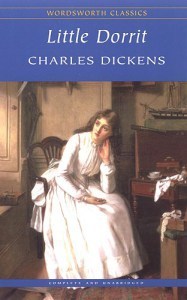
I will read this someday. I promise. Someday I will not be busy; I will not be tired; I will have nothing to do.. (What happens to people who break promises?)
I should read more. Who doesn’t say that? But I should/want to read. I just don’t have the energy. Researching self-publishing and revising leaves me tired. Also, finding a book is a daunting task. By the time I find one, I just want to sit down and veg in front of the TV. I love a good classic, but writing sci-fi makes me want something more contemporary and imaginative. There is a big grab bag, which my novel Sympathy-B is a part of, and it’s mixed when it comes to goods. Going through them is time consuming, but I have settled on one: Legend by Marie Lu.
Ultimately, it’s not the form, it’s the storytelling I’m after. Whether novel, movie, or tv show, I want a sense of intelligent and creative storytelling where the characters have spark and layers and the mode (visual or prose) also has it’s own spark. With prose, the struggle is finding books where the writing can conjure my imagination (not just my imagination working overtime to bring dull prose to life). Unfortunately, with all genre storytelling (I’m speaking from experience too…I’ve been there), the need to generate plot, our story, (character, a literary writer’s story) often overwhelms character (as character, and even setting, can overwhelm plot in a literary/hybrid novel). And as plot overwhelms, the character’s, particularly their motivations, compromised, the storytelling loses scrutiny.
Is genre fiction art? One one hand it’s all art, because it’s all craft. On another hand, it often doesn’t reach a level of creativity and storytelling skill to make what you are experiencing seem like art, artful. The same goes for literary fiction, but cultural biases based in stereotypes works in its favor. Genre fiction is struggling to validate itself as art, because it isn’t held to a standard. Any great art, should be able to not only survive scrutiny, but flourish under a close reading that reveals a spring of motifs and themes. Unfortunately, the hasty and unskilled writing makes the work unravel under examination, falling a part into mediocrity. So viewers learn to just skim the surface, see how a work suggests or uses signifiers to get at complex ideas, and ignore the faux pas that plague the work from creating a coherent message (or worse, create a message that’s unintentionally oppressive to a group of people). When people do try to hold genre to a standard, people protect the form by trivializing it: “Don’t take it so seriously, it’s just a TV show.” Yet, when people say it’s not true art, they are also called snobs and pretentious. People will defend the genre they love by simultaneously encouraging people to not take it seriously, then judging those that don’t. Ultimately, the subtext seems to be to just love whatever’s done and justify it however you need to. I wish I could. I think too much as is.


May 1, 2013
Craft of Fiction 0: Vision
Sitting in an undergraduate writing class, we, the students, were asked by the teacher to start listing the elements of craft. As is common, character and plot were the first, usually character first. Then, in my grad years, a professor took a red strikethrough on her word processor and crossed out about 90% of my text. She commented that I needed to stick to the story. By story she must have meant the plot, the events. But the plot wasn’t the point. What went wrong? I had not clearly communicated the intentions of my work. I didn’t do what I needed to do to convey to the reader what the story was. I cried, thought about it, then wrote a breakthrough piece while listening to a song that made me cry, Alicia Key’s Like You’ll Never See Me Again.
I could have been pretentious. I could’ve blamed my professor, called her stupid, for not getting my work. But I didn’t. I was new to the craft even after two years of classes, and I trust my teachers (at least until I graduate). I believed she was well-read and believed in all the possibilities of what a novel could be, because I heard her more than once a week talk about literature. This was why I took her up on her offer to read my work out of workshop in the first place.
At the end of semester, I submitted a revision to the story…no strikethroughs. I had clarified and crystallized the vision for what I wanted my work to be. I did not take her advice to tighten the writing around the plot, though. Instead of pulling back, I pushed forward, creating larger degrees of abstraction. I created a vision for what the work was supposed to be, then used my full understanding and skill of craft at that moment to make it happen.
The style I had adopted was still criticized. However, my vision for my work had proven a useful measuring stick. People will always take issue with your ideas of craft and hence your story, but if you are clear on your purpose and approach to writing, you know which criticism are truly constructive, helping you take your work to the next level, and which are deconstructive, turning you work into a safe reductive mess to validate their own ideas about literature. However, please note even bad criticism can be good. You can read underneath the critique. If someone says not enough happens in your ten page stream of conscious story, you can still take the criticism to heart with some reinterpretation. For example, your story may not be plotful (arcs of changing external moments), but have you done enough to portray the waves of internal changes in your character’s psyche? Did you do enough to map the emotions underlying the meditation and still bring a sense of a psychological arc, even if subtle? Too subtle? Not subtle enough? Are the micronarratives fleshed out? Did I get the depression and yearning in the subtext for this one memory? Allow the critique to launch you into an associate query about your own writing. Let it turn into a meditative stream, taking you further away from the workshop and deeper into your self and your beliefs and values about your writing.
The vision for your story becomes the most important element once you’ve learned all the other elements. After all, your vision will be informed by your understanding (and reworking) of them. What will your approach to character, details, plot, narrative, prose style be? You have to know what these elements entail first before shaping a vision out of it. You will learn the basics, then think about the basics, then obsessively debate the basics, until finally building and bending the guidlines of craft–you will emerge from the caccoon of your mediation with your own idea of what a story is. A writer is born.
Vision is the zeroth element of craft, the element that is the umbrella to all other elements. Usually it is a hazy idea. It’s not sitting down and writing down your approach to each element. It’s an internal certainty that you know what your work wants to be with some signifiers. For my novel Sympathy-B, my vision was to have a superhero action series that was centered on well-developed characters and to have the action utilized in the character development and movement of plot. I didn’t want to feel bogged down by long essays of world building; so I used the narrative arcing and character’s to explore different facets of the world I created. With this vision, I knew I was drawing on my love for comic books and cinema. I didn’t know exactly what the narrative was going to be, how the characters would be, but I had a strong sense of them before I began writing. As a result, I didn’t feel the need to throw away the whole manuscript. Usually, when I have to rewrite something from scratch, it is because with each manuscript I’m just getting a little bit clearer on the vision for my work. Once I have the vision, the next draft is something I’m very proud to have written.
Related articles
The Separation Of Art From Craft In Literature. (folioandink.wordpress.com)
The Road to Sympathy-B: Chris Claremont’s “X-Men,” Michael Grant’s “Gone” (mradamsliterary.wordpress.com)
“Practical Advice for Beginning Fiction Writers” – by Stefan Vucak (authorshelpingauthors.wordpress.com)


April 29, 2013
Sympathy-B: What’s in a Cover
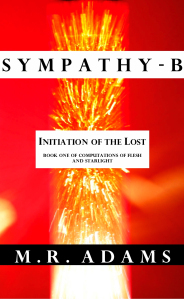 With a change in approach in publishing, comes a change in cover. The picture is the same: A cropped photo of a test tube of exploding light. The test tube represents the finitude of the physical/science/the thinking mind; the exploding light, the infinitude of the intangible/potential/the spirit. Experimenting with the creation of spirit, the fulfillment of the potential.
With a change in approach in publishing, comes a change in cover. The picture is the same: A cropped photo of a test tube of exploding light. The test tube represents the finitude of the physical/science/the thinking mind; the exploding light, the infinitude of the intangible/potential/the spirit. Experimenting with the creation of spirit, the fulfillment of the potential.
Title Series: Sympathy-B
Reading the book will make the title series clear.
Volume 1: Computations of Flesh and Starlight
Computations=measurements, quantifying/theorizing
Flesh=Body
Starlight=Spirit
Measuring/quantifying/theorizing the body and spirit.
Book 1: Initiation of the Lost
Initiation: 1 the action of admitting someone into a secret or obscure society or group, typically with a ritual:
2 the action of beginning something:
Lost: 1 unable to find one’s way; not knowing one’s whereabouts:
2 denoting something that has been taken away or cannot be recovered:
3 (of a game or contest) in which a defeat has been sustained:
Originally, Computations of Flesh and Starlight (Vol 1.) was going to be split into a book one and book two. Each book would contain two acts in two parts. The first book was going to be published as a whole. However, I decided to break the book into more easily digestible segments (for reader and writer/editor/publisher). So Act One Part One, Act One Part Two, Act Two Part One and Act Two Part Two (the contents of the original first book) will now be split into four sections, four books. Formatting and editing the entirety was/is just a chore. It was beginning to overwhelm me to the point of quitting.
So the original Book 1, needed a title change as the theme of the original title does not come into play in this installment. Also, I realized the book name should take presidence over the volume name. So Initiation of the Lost needed higher billing than Computations of Flesh and Starlight.
Cataloging: Sympathy-B > Computations of Flesh and Starlight > Initiation of the Lost > (Act I title > Part One > Chapter Title)*
* Parentheses denotes titles left to the interior of the book; they are not on the cover.
Now for titling the cover, the volume and the book title are switched in the hierarchy of the billing. Initiation of the Lost > Computations of Flesh and Starlight.
It took me a while to understand this, never having done a series, never mind one with such leveling: Series>Volume>Book as opposed to the more typical Series>Book. Because Sympathy-B was inspired by a comic book series, I added the volume level to cover each arc. Volume 1 is an arc split up to books. Volume 2 will be an arc split into books. Volume 3… etc.. If Harry Potter came out with a sequel series, the first series would be like Harry Potter (series): The Lord Voldemort Saga (volume): Harry Potter and the… (book) in order to accomodate the new series. Or the series could just rename itself and the reading order can be left to word of mouth.
Cover Image:
Explozoom 2/2 by jepoirrier (Jean-Etienne Minh-Duy Poirrier) on flickr
Creative Commons Attribution-ShareAlike License
Related articles
The Road to Sympathy-B: Chris Claremont’s “X-Men,” Michael Grant’s “Gone” (mradamsliterary.wordpress.com)
“How Bad Is Your Bad Guy?” ~ by Mercy Pilkington (authorshelpingauthors.wordpress.com)


April 26, 2013
The Road to Sympathy-B: Chris Claremont’s “X-Men,” Michael Grant’s “Gone”
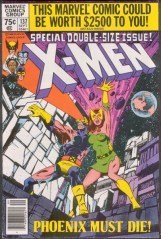 Like many of my generation, I discovered comic books after watching the X-Men saturday morning cartoon. The turning moment was the Dark Phoenix Saga. The story of Jean Grey’s corruption and near destruction of the universe sent me on a mission, hunting (chauffeured by my mother) for any comic related to Phoenix. the first thin floppy book I bought that was technically but not culturally called a picture book had the Phoenix engulfed in flames, stretched out in heroic pose. It was an issue of X-Men Adventures: the comic book adaptation of the cartoon. But it was only part of the story; I needed more. So my wonderful, loving mother helped me hunt down comic stores, none of which were close to our hometown, and we drove miles for over an hour in weekend Hampton’s traffic to a town that would change my life. From a small store, a box of a place, I purchased Uncanny X-Men 137 (Phoenix Must Die) for about $15.
Like many of my generation, I discovered comic books after watching the X-Men saturday morning cartoon. The turning moment was the Dark Phoenix Saga. The story of Jean Grey’s corruption and near destruction of the universe sent me on a mission, hunting (chauffeured by my mother) for any comic related to Phoenix. the first thin floppy book I bought that was technically but not culturally called a picture book had the Phoenix engulfed in flames, stretched out in heroic pose. It was an issue of X-Men Adventures: the comic book adaptation of the cartoon. But it was only part of the story; I needed more. So my wonderful, loving mother helped me hunt down comic stores, none of which were close to our hometown, and we drove miles for over an hour in weekend Hampton’s traffic to a town that would change my life. From a small store, a box of a place, I purchased Uncanny X-Men 137 (Phoenix Must Die) for about $15.
I knew something was off. The Uncanny X-Men issue was on rough paper, the characters were dressed differently, the art style also different; quite the difference from the glossy modern X-Men Adventures. My younger self did not even register the different titles, I was only concerned with the images. I read the classic issue of Uncanny X-Men, and I officially became a collector. The ending (oh that ending)…so different from the TV series…I’ve owned about five issues of the comic, keeping back up copies for when I read my current copy to pieces. Thankfully, trade paperbacks came to save me. With the first Dark Phoenix trade, I finally got to read the whole saga and didn’t have to lament when the issue skyrocketed in value thanks to Jean Grey returning to her Phoenix costume. I’ve owned multiple versions of the TPB. The first one needed replacing after I used a highlighter to circle images so my mother could photocopy them black and white, a custom coloring book. I love my mother.
The Uncanny X-Men was one of the few titles that had diversity that didn’t feel forced, like it was pandering to political correctness. Bishop was the first black man I had met in literature that wasn’t a Jim Crow’s black man. He was a soldier on a mission, and he had the agency and skills to make things happen…he was a hero. He was oppressed by his times, but he could fight. He was angry, but in a righteous way. He saw loved one’s die, saw his (human) race oppressed, and became a freedom fighter. Up to this point, the prominent black men I faced in literature were (child) rapists, abusers, or kindly men who had succumbed to their tragic fate’s. Interestingly enough, I never thought of the momentousness of all this, until now, as I sit here and write.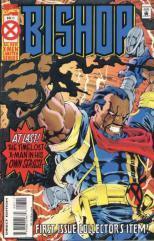
The X-Men, in reflection, were about about a group of minorities (primarily genetic minorities, secondarily racial/national minorities) coming together to fight for social justice, the protection of their species. They had to learn to fight together and became a family. It was a story of people coming together, set against the backdrop of a political discrimination, racism. The X-Men and their villains represented the two paths one can take when growing up oppressed. You can fight for justice; or lose faith in your fellow man and seek to denominate him. Either way, you would be free.
I stopped reading any X-title regularly in middle school. However, my first year of college, I feel into a depression (not clinical). I felt very alone. And one day in the bookstore I saw the first and second volume hardcovers to Grant Morrison’s New X-Men. They were expensive, the art was kinda odd–I went home. But that night, I was restless. I couldn’t sleep. I needed something to help get me through the semester. And what if they were gone? I went back looked at the two and bought the second volume. I read it…loved it…and went back for the first volume. I was a comic reader again. In my adult life, I read the omnibuses and trades. I may not read X-Men monthly, but I check in on them: from New X-Men, to Astonishing X-Men, to Messiah Complex. to Uncanny X-Force…I’m always looking for an “in” to get back to my fictional family. Currently in the X-Men universe, the politics feel more central than the characters, the attempts at diversity feeling just like that attempts: a gay character here, a middle eastern character there. It is good to see Storm rising to prominence again though.
Another major event in my life was becoming a writer. I always had a storytellers imagination. I can’t watch a movie without recasting and redoing scenes. Something I didn’t 100% fully realize now, was how I’ve become a fighter, writing stories with racially and sexually diverse casts, determined to do my part to create new images and portrayals of under-represented groups.
So out of my nostalgia for X-Men, joy for superhero comics, and my new identity as a writer, I decided to explore comic book writing. I created Ellington, the central characters to my first graphic novel idea. But I was still in the throws of learning my craft as a fiction writing, trying to learn comic scripting was too overwhelming. I put the dream on the back burner, but Ellington would still be a point of daydreaming. As I continued to write fiction, their world grew into a universe.
Fast forward: I finished my first novel, couldn’t get it published for a layering of reasons, told I was pretentious and trying too hard to be smart by Amazon’s Breakthrough Novel “experts,” couldn’t imagine writing another novel so I became (and still am) a pop/rock lyricist, but then I needed to return to prose. Every time I write something, I just think I’ll never have another idea, I’ll never be able to express myself as well as I have before, I’m done and I can’t do it again. Time passes; I recover, rejuvenate. Time to get back to prose. But what to write next? Not another literary novel–I already felt like a failure. The idea of trying to follow up the first (now self-published) literary novel with a second novel just left me deflated.
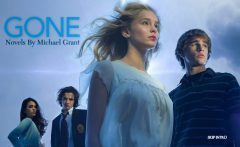 I had two ideas: my second literary novel, and Sympathy-B, the universe birthed from Ellington. Something had changed to make me think Sympathy-B could work in prose…Michael Grant’s Gone. Gone is about a town whose adults suddenly disappear, leaving a cast of young people trapped under a dome…manifesting superpowers. I found the fight sequences effective, I could imagine them. As a comic book fan, I naturally (aka was programmed) to believe superheroes could never work in prose. But Gone made me re-evaluate that belief. Now as a writer, I began to imagine how to convey psychic powers on the page. How should such a work be structured. Time to start writing.
I had two ideas: my second literary novel, and Sympathy-B, the universe birthed from Ellington. Something had changed to make me think Sympathy-B could work in prose…Michael Grant’s Gone. Gone is about a town whose adults suddenly disappear, leaving a cast of young people trapped under a dome…manifesting superpowers. I found the fight sequences effective, I could imagine them. As a comic book fan, I naturally (aka was programmed) to believe superheroes could never work in prose. But Gone made me re-evaluate that belief. Now as a writer, I began to imagine how to convey psychic powers on the page. How should such a work be structured. Time to start writing.
I wrote Sympathy-B over about six months. I approached the idea of writing a novel that had diversity, pseudo-science, where the action wasn’t just a squence dropped into the narrative but was fully charged and integrated into the plot. I took lessons of superhero narrative from Claremont (telling stories in a series of action sequences that provided spectacle and character development), my undergraduate scriptwriting classes (structuring a narrative into sequences and plot points), and my beliefs about YA, wanting to see more challenging works for younger readers, and threw it all away as I dug into my universe and finished the draft.
With each chapter, the novel grew. Ellington became surrounded by classmates. They had mentors. The world became a place of revolution and crisis. Businessmen warred. Governments unionized. But at the heart was always the conflict between young people who have to fight to become a family. And they had to become a family to survive…and thrive. In the coming weeks, I look forward to sharing with you their world, a place where new leaders are born.
Related articles
Chris Claremont: Famed X-Men Scribe Profiled By LA Times In Anticipation Of The Wolverine, X-Men: Days Of Futures Past (notthesingularity.com)
Mutant Women of Earth: How Chris Claremont Reinvented the Female Superhero (comicsalliance.com)
X-Men 1990′s (scostain.wordpress.com)
Review: Gone by Michael Grant (charlotteunsworth.wordpress.com)
Try It Tuesday! – GONE series by Michael Grant (dustlands.wordpress.com)
Gone (Gone #1) by Michael Grant (somanybookssolittletimebookgroup.wordpress.com)


April 21, 2013
Movie Followup: The Girl with the Dragon Tattoo
One More Thought:
- Since sex figures so prominently, the classic (and continually necessary) question of “Was the sex gratuitous and unnecessary?” should be asked. You don’t need to see the rape to know its horror, but it does make sense when you consider sex as a motif in the film. Also, I would argue that the lesbian sex should have been shown as well. Lisbeth’s sexual encounters develop her as a character. She has two psexual encounters with two men in the movie that involve penetration: the first forced, the second initiated by her. Sandwiched in the middle is a same-sex encounter. At first glance the two male encounters may seem like foils, exact opposites. But in fact they are a yin yang of domination/submission politics. The forced encounter, Lisbeth is in submission, but in the end turns to her domination. With the initiated male encounter, she is in domination, but in the brief last moment of the film allows the male to flip over and take over. The themes arise from the bedroom motif because of the detailing (which means good writing).
Between the two male encounters is wedged the female encounter. Lisbeth seems coy and submissive as a woman hits on her with clear intentions. However, the sexual encounter is never shown. We don’t know how she plays out the relations. The sex should have been shown in detail to continue to develop the motif and hence the theme (and hence the character). So ultimately, yes the sex of the movie, in general, has artistic merits to be shown. However, some merit is lost with the gender imbalance of the most graphic qualities of the portrayals.
Another ultimately: The sex scenes as structural motifs are more complex here than in another movie with justified sex scenes, The Town. In The Town, the two sex scenes work idealistically to show a man’s development for the positive through him having a hookup with a “trashy” archetype, then later having a love-making session with “the woman in white.” The two contrast, and hence link, themselves as theme/motif scenes even further by having the trashy encounter at night and the classy encounter during the day.
Related articles
The Decline And Evolution Of Sex Scenes (dish.andrewsullivan.com)
Movie: The Girl with the Dragon Tattoo (mradamsliterary.com)
What Does Your Sex Mean? (livingromcom.typepad.com)


Movie: The Girl with the Dragon Tattoo

We are as deep as you want us to be because we are that specific and vague.
Some Thoughts:
- This movie relies heavily on artistic signifiers rather than actual character and thematic exploration to create its artsy vibe. Dark images, mopey/badass characters, nudity, rape, Nazis, etc.
- The decompression of the storytelling served to create a slow burn of suspense. But I would’ve preferred something quicker to leave more room for character exploration. The use of carefully selected pieces to portray characters is commended, but on the other hand, it seemed like shorthand. There is a difference between reading into something and close reading, and the line feels fine to me. Also I wish I saw more how conclusions were reached. It seemed convenient details just popped up to lead to the conclusion.
- I wish the painting ultimately had more significance to the narrative. It was beautifully and poetically set up, but never utilized.
- Despite my perceived shorthand, I still found the characters interesting case studies. I hope they are fleshed out more in the sequels. Maybe create a plot that demands them to reveal more of themselves as to maintain the show over the tell approach.
- I don’t plan on reading the books. I previewed the first one and the writing just did not draw me in; so I was excited for the movie as a substitute. But now I wonder what the character work of the novel would have revealed. Sometimes movie versions of characters do in fact feel like approximations to their literary counterparts.
- Overall, despite the fact I keep focusing on my criticism, I did like the film and want to see the sequels.
- Showing Lisbeth’s victimization in such detail was validated by her revenge. The directing was clever: the image of panning away from the door hearing the screams is classic code that the scene will end and we can infer what happened. But then it flashes back to the bedroom. Great subversion. Watching, I became skeptical. It seemed some bad TV movie writing that she could take the guy at the subway but not the fat guy. I also I wondered why she just didn’t bite his penis off in a previous scene. But the revelation later made me feel silly for not trusting the writing. Also, it kept the scene from haunting me after the film was over.
- Lisbeth is all kinds of naked, frontal and rear, throughout the film, plus some other images of breasts. However, there isn’t even one decent shirtless shot of Daniel Craig or any other of the good looking men. Only the fat guy with his robe open. The naked women wreaked of male artistic pretensions: “This is edgy,” “This is art because it’s ‘naked’ and requires commitment.” I think Craig showed his butt crack in a rather distanced shot. That was the only private part shown. Some gender balance on the nudity would have been nice.
Update: Followup Post
Related articles
“The Girl with the Dragon Tattoo”…Again (ccyager.wordpress.com)
The Girl With The Dragon Tattoo – An Adaptation Analysis (therewillbeblogblog.wordpress.com)


April 20, 2013
On Narrative
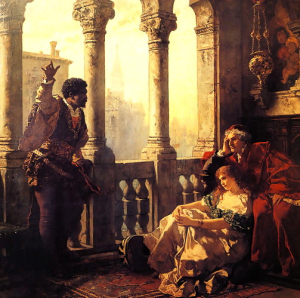 If there are as many levels of narration as there are levels of consciousness, and if consciousness is like the matter it manifests: one subdivision begetting another subdivision thought to be the last subdivision until another subdivision is discovered, and this process repeats to the point where people, at their most explicit level of consciousness, throw their hands up in exasperation and exclaim, “Matter must go on forever!”—then the levels of consciousness, and the narrations that spring from them, are infinite. It all goes somewhere; it all goes nowhere.
If there are as many levels of narration as there are levels of consciousness, and if consciousness is like the matter it manifests: one subdivision begetting another subdivision thought to be the last subdivision until another subdivision is discovered, and this process repeats to the point where people, at their most explicit level of consciousness, throw their hands up in exasperation and exclaim, “Matter must go on forever!”—then the levels of consciousness, and the narrations that spring from them, are infinite. It all goes somewhere; it all goes nowhere.


M.R. Adams's Blog
- M.R. Adams's profile
- 2 followers


